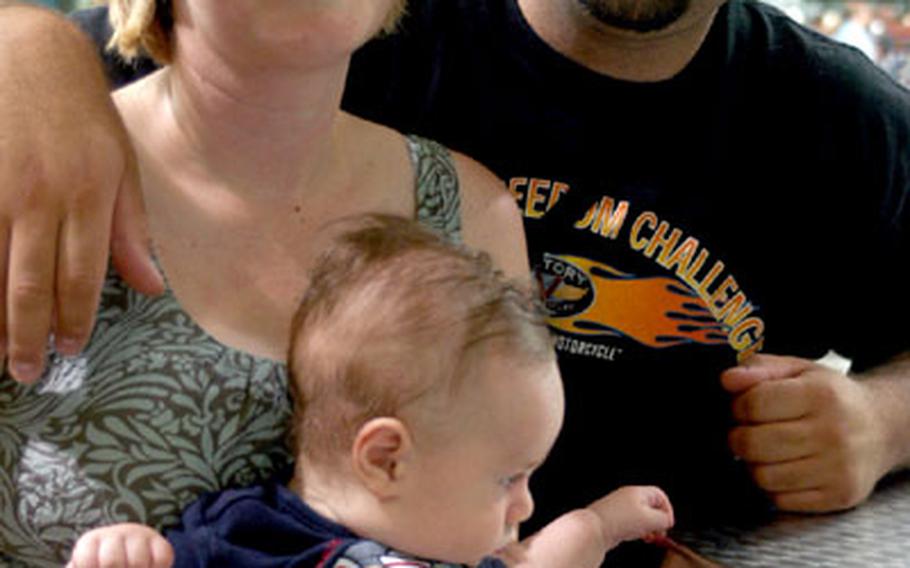
Air Force Capt. Jennifer Tay and her family, shown after safely reaching Cyprus. (Courtesy of Jennifer Tay)
LARNACA, Cyprus — Like many Americans in Beirut last week, Air Force Capt. Jennifer Tay from the 48th Medical Group was overtaken with surprising swiftness by the fighting in Lebanon.
The 31-year-old audiologist from RAF Lakenheath, England, was just a few days into a vacation with husband Talal, a Lebanese, and 3-month-old son Abram, when she woke to the sounds of gunfire and explosions in the city.
“I just remember hearing an anti-aircraft [gun] firing from the hills of Beirut,” Tay said of the first time she found herself close to the fighting.
By the next day, the Tays would be in flight from the city with other members of her husband’s immediate family, trying to escape the bombings and embarking on the first leg of a long and dangerous odyssey that would lead them back to England on Monday night.
With their infant son and two other small children in tow, one of them a 2-year-old with Down syndrome, the Tay family first fled to the mountains, then returned to Beirut to get into the evacuation pipeline funneling people out of the city to safety.
It was a long, stressful saga that drew to a close early this week when the family boarded a plane at a Cyprus airport bound for London, where Tay said she was relieved to be finally going home.
The flight out of Cyprus came after several harrowing experiences that Tay said have been some of the most frightening of her life.
Trouble started when Israeli warplanes began to bomb the Beirut airport last week not far from where she was staying with her husband’s family.
The explosions were close enough to be seen, heard and felt, she said.
“We could see it, we could see all of this — we were within a mile of it,” she said.
Seeking refuge the day after the strikes started, the Tay family went to another house in the mountains outside Beirut, she said, but the move was short-lived.
That night, the family heard reports that the Israelis planned to bomb the bridge the Tays needed to cross to get back to the city — and shatter any possibility of evacuation — so after one day outside Beirut, they returned to the city.
Explosions continued to rock the airport area, she said, and that night a gas plant was struck, touching off an explosion so large it knocked her 5-year-old niece to the floor, she said.
“It was so loud I thought the windows were going to break,” she said. “It was the most scared I’ve ever been in my whole life.”
Holding her young son, Tay and her family hurried into a bomb shelter in the building where they were staying and spent much of the night there, she said.
With the bombs falling so close, the family moved yet again, this time to a hotel in the city — a dive with rooms they later found out could be rented by the hour, Talal Tay said.
Unhappy with the situation, they found better accommodations and renewed their efforts to get information from the U.S. Embassy in Beirut on how to get out.
But after three days of searching and waiting in vain for a spot on a helicopter or boat, Tay said, the family was told to just go down to the pier — where a chaotic crush of frightened people was trying to get through a guarded gate separating them from U.S. Navy ships waiting to evacuate Americans.
“That was just a free-for-all,” she said of the throng at the gate.
By then, the group was seven people strong — the Tays, plus Talal Tay’s brother, his brother’s wife and their two children. They arrived as instructed at 4:30 a.m., in the dark, where they sweated through seven hours in line before they were able to board a ship bound for Cyprus, Tay said.
Finally in the hands of the U.S. military, the active-duty captain said she felt waves of relief.
“Once I saw the Navy and Marines … they were fantastic,” she said.
The Tays boarded the USS Trenton, packed with nearly 1,900 people, and arrived at the port city of Limassol 12 hours later.
Two days after arriving at the port of Limassol, the Tays were at the check-in area of Larnaca airport, just minutes before their flight to London was scheduled to depart, their long journey almost over.
Holding her son, who looked fine Monday despite his ordeal, Tay said she felt one thing: “Relief.”
“I just want to get home,” she said. “This was the worst vacation ever.”